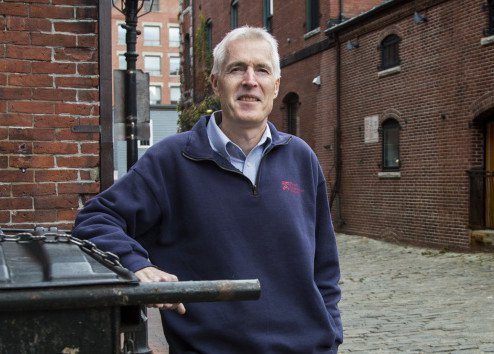Steven Finn used to work in the distribution sector, running the financial side of industrial supplies (literally nuts and bolts he says). He spent a lot of time on the road globally, focusing on numbers, control and efficiency, but after 25 years he started thinking about what was missing.
He’d always had an interest in the environment, but sustainability caught his attention, and although he already had an MBA, he went back to school for a master’s degree in organizational dynamics at the University of Pennsylvania, where he concentrated on global food waste.
“I became enamored with the triple bottom line,” he said, referring to a corporate philosophy that prioritizes social and environmental responsibilities as well as profits. “Why aren’t more organizations trying to do good in addition to making money?”
Now he’s teaching, running a sustainability and change consultancy called ResponsEcology, and as a recent transplant to Maine, diving into local food issues. (You might have spotted him serving food at the recent Feeding 5,000 event in Portland.) We called him up to find out what lured him to Maine and learned about everything from dumpster diving to what our big fridges say about us.
STATE AND MAINE: His teaching gig is at UPenn and the class he typically teaches is called Global PENNovation, a “deep dive into a major sustainability topic, like food, or water security.” From Portland to Pennsylvania seems like a very long commute; why move to Maine? Finn said he came for a gig at composting giant Casella, but internal disagreements over how to prioritize sustainabiity initiatives cut that short. “It’s enabled me to get back to the food-to-people piece of the hierarchy.”
SEMINAL MOMENT: When Finn was traveling in Sweden, he was struck by a refrigerator in the window of an appliance store. It was the size of a fridge a college student in the U.S. might have in her dorm room, but it was intended for the average home. It spoke, he said, to a concept the Swedes have, of having “just enough,” that Americans aren’t used to. One of the people he met in Sweden remarked to him, “You Americans do everything big” and attributed that quality to the U.S. having won the war and saved the world. “You had swagger, and you did everything big,” he recalled them saying. This gave him serious pause. “It made me think about myself as a parent. What do we all want for our kids? We want to create a better world for our kids.” After World War II, Americans re-created the world as one ruled by abundance, he said.
“It is amazing to me just how fast that transition occurred,” he said. “It’s all around us, on a 24/7 basis, we can get any variety of food at any time. And there is a great cost to that.”
PRESCRIPTIVE: “We need to shift that, to recognize that we simply can’t go on wasting all of this.” And by “this” he means not merely cleaning our plates, but understanding that it’s not just food that gets wasted, but the energy that was used to create it. He looks at it from an opportunity costs perspective. “If you think about what else we could have done, all the human capital, the human labor – if we put that into social enterprises, if we put that into some positive environmental action.”
Finn has a blog, foodforthoughtful action.com, which he uses mainly as a creative outlet and place to collect the latest news on these issues. “I look at it as providing a resource for learning more about food waste and food insecurity.”
ARE YOU GOING TO EAT THAT? Finn is a dedicated user of the PowerPoint presentation, and he features photos he’s taken himself, including one of a pile of roasted chickens. Like, a big pile. He has a habit, he said, of documenting egregious examples of food waste at restaurants and markets. “I sometimes swing around to the back and see what I can find.” In that particular case, at a supermarket, “It was a January or February day and I could smell these chickens. It was like Thanksgiving. It smelled tremendous.” The chickens were still warm. “There was absolutely no reason they couldn’t have been eaten.”
He encourages shoppers to ask their retailers what they do with their excess food. There has to be a better place for chickens an hour past their sell-by date to end up than the dumpster.
KITCHEN TIPS? Since he’s the waste expert, what tips does he have for getting the most out of a load of groceries? “Use your freezer.” Plan better. “Shop your pantry.” And maybe dedicate a day every week to using up leftovers. “Maybe it’s a stew or a quiche, somewhere where you can put a lot of foods together.” Soup and pizza are popular vehicles for leftovers. “Shepherd’s pie is another example. My kids (he has four, two still at home) love that because of the mashed potatoes.”
Then there’s taking, let’s say, a more considered view of the sell-by date on food. “So many of us think you pull that milk out of the refrigerator and you better dump it all because it is past the date.” Stopping food waste is an important step in the fight against climate change, he said. “We ought to be talking more about it.” At this point we had to ask, is he acquainted with U.S. Rep. Chellie Pingree’s work on this very issue? Yes. “Ironically, I moved right into Chellie Pingree’s district.”
Send questions/comments to the editors.




Comments are no longer available on this story